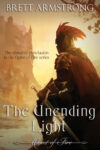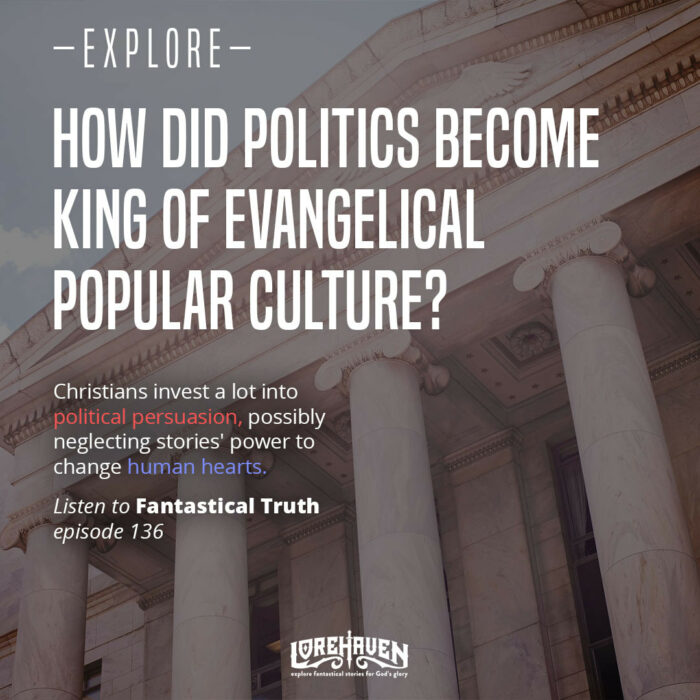136. How Did Politics Become King of Evangelical Popular Culture?
Podcast: Play in new window | Download (Duration: 1:29:29 — 83.3MB) | Embed
Once upon a time, evangelical subcultures loved spiritual warfare books and prairie romances. We liked angel figurines and Amish novels. We shared adult coloring books starring small boys who have afterlife visions. Now our subcultures have been overtaken by another trend—politics. When and why did this happen? Should we try to change it? Welcome to Dystopian Doom, our next series of episodes about bad governments and good citizens.
Subscribe to Lorehaven
articles • news • library • reviews • podcast • gifts • guild
Episode sponsors
- Enclave Publishing: Aberration by Cathy McCrumb (ebook, hardcover, audio CD)
- Mountain Brook Fire, The Chase by Bradley Caffee (audiobook, ebook, paperback
- David Umstattd, The Pilgrim’s Progress Reloaded
Explore the complete Podcast Sponsors page.
Quotes and notes
Concession stand
- Happy post-Halloween! Check your kids’ candy, lest they find politics.
- By evangelical popular culture, we mean an entire world of things.
- This includes names, bands, shows, leaders, books, memes, and beyond.
- By politics we mean “matters of public policy,” that is, law and culture.
- Not just people/parties and working/professional/rivalrous relationships.
- We do believe politics do matter a lot to Christians’ witness in the world.
- If you doubt us, check our social feeds. We talk about politics some.
- In fact, I’d specifically disagree with folks who try to minimize politics.
- Usually “public witness”/nuance sorts ignore realities like Sexualityism.
- To ignore crucial, gospel-altering issues like these is to lie to one’s self.
- And we contend that some issues are not political but religious conflicts.
- But. If everything is politics, then nothing is. It’s all work and no rest.
- You may find some old evangelical fandoms making cameos in here.
- We also follow our episode 40, about how stories shape views of politics.
1. How did Christian fads create political obsessions?
- Our memory/research is very generalized, going back to the 1970s.
- 1970s: the Jesus Movement, early Christian rock and roll, early end times.
- 1980s: more end times, CCM, kids’ audio and videos, spiritual warfare.
- 1990s: even more politics, sentimental angels, upgraded end times, Y2K.
- 2000s: more Left Behind, men got to man up!, Prayer of Jabez, Sept. 11.
- 2010s: few trends, coloring books, Jesus Calling, Christian social dramas
- But at this point politics really began taking over even Christian movies
2. How does politics reign over evangelical cultures?
- In the 2000s the issue was terrorism and concerns over militant Islam.
- In the 2010s we had confusion between policies and actual faith issues.
- E.g., people acted like (if not believed) taxes and borders mattered more.
- Now we see Christian/Muslim teamups over one bigger, important issue.
- In this decade, we’re seeing unity against the Sexualityism crusades.
- More candidates are supporting/opposing this view of faith/life/family.
- (For Stephen’s part, this is his personal “trinity” of single-issue voting.)
- In that case, these issues are far more about how we imagine the world.
- Speaking “in fiction,” they’re about worldbuilding, not just neutral policy.
- Literally we’re dealing not with human law, but how we see natural law.
- So how much more do we need more than civil laws to defend these?
- We’ve needed proactive stories that imagine/challenge faith/life/family.
- And yet until very recently, only a few Christians have emphasized this.
3. Why must we invest in stories, not just policies?
From the original article:
We bought into promises from political activists and candidates to help us build a better America from the top-down, and the top-down only. Most of us took that shortcut. We dumped resources into forging political movements, political nonprofits, political fundraising, networks, pundits, activism, campaigns, and . . . debates galore, neverending debates on all our websites and podcasts and platforms.
All these pushed all the other Christian popular subcultures to the margins. . . . Our cultural imagination collapsed. Promising niche offerings, such as uniquely Christian audio drama, went unsupported and thus underfunded. Big Idea Productions went bankrupt and was bought out (yet now it could still come back, thanks to streaming Christian media). “Contemporary Christian music” also lives on, yet often reduced to simpler “worship” tunes that are suitable mainly for churches (where you can’t sing cleverer songs about how they don’t serve breakfast in Hell).
Even if all that stuff earned the same attention, it’s nowhere near the level that U.S. Christians give to politics: candidates, pundits, movements, debates, obsessions. . . .
I contend a Christian popular subculture obsessed only with politics is a weaker subculture. Even if you were a shallow Christian who had turned his faith into a means toward political ends, it would make zero sense to focus exclusively on politics. Even for such a Christian, you must also focus on the rest of popular culture: the stories, songs, games, memes, and imaginations that take that shortcut past the head and into the heart. How much more so, then, should faithful Christians who do make Jesus the chief end—and any political engagement the means—see that Jesus has called us to steward our creative investment in stories, songs, and even film franchises and music bands (however derivative) for his glory?
Over the timespan of generations, a Christian subculture dominated by politics is hopelessly limited and ultimately ineffective for forming more Christlike people.
- Stephen wrote that in January 2021, but some has changed since then.
- In less than two years, more folks have been talking about doing stories.
- He name-checked The Chosen, but Angel Studios is doing even more.
- For instance, they’re releasing the Wingfeather TV series next month.
- On this podcast, we’ve talked with Daily Wire staff who are doing stories.
- And many, many Christian fantasy creators are stepping up their game.
Com station
Jacob Mooney replied to ep. 135 about Nephilim:
It was a very good episode with wise perspectives and cautions.
Kevin Robinson also replied to that “giant” episode:
Methinks you might be dismissing NEPHILIM…EPHILIM…ephilim…….. too quickly. ;-P And you call yourselves speculative fiction lovers.
But seriously, this subject is WAY more interesting and deeper than you think if you actually look into it, and not just in a paranormal, conspiracy sorta way. Michael Heiser’s books give a pretty convincing argument for the more supernatural approach to, not just Nephilim, but the Anakim, the Heavenly Host, actual giants (9 or 10 foot tall), all of that stuff and he uses way more than a few verses in Genesis 6 and Numbers or whatever.
. . . You might find yourself sucked into some very interesting “speculative theology” if you dare to look deeper. But I very much appreciated both of you guys’ careful and cautious approach to the subject. There are FAR too many who are obsessed with this subject…probably in unhealthy ways. Great discussion as always, gents.
David Wright on Twitter also remarked:
I really enjoyed your #FantasticalTruth on the Nephilim. I’m someone who *wants* to believe a supernatural meaning, but the point about the lines of Seth and Cain was eye opening. Love your show!
Also, I really took to heart the point about how Spiritual Warfare stories in #ChristianFiction need to keep the blame on flawed humans and not on some external conflict between angels and demons.
Meanwhile at Lorehaven
- We’ve closed the crypt on Dracula, yet some heroes still talk about it!
- This week we begin our new book quest into Andrew Peterson’s fantasy.
- To join either, and find the best Christian-made fantasy, join the Guild.
- Subscribe free at Lorehaven.com and get your exclusive invitation.
- See last week’s articles about Christian paranormal thrillers and Twilight.
- We also reviewed Frank Perett’s The Oath and Marc Schooley’s Konig’s Fire.
- This month, Lord willing, we’ll have more Dystopian Doom content.
- Our next review covers On the Edge of the Dark Sea of Darkness.
Next on Fantastical Truth
No discussion about dystopian doom would be complete without these two classic books. They’re not Christian-made. But they affect so many people’s fears and legit concerns about not just dystopias but fake utopias. And last summer, Stephen read both for the first time, sending himself into sporadic literary depression for the sake of education. These two dystopian books are Aldous Huxley’s Brave New World (1932) and George Orwell’s Nineteen Eighty-Four (1949). What are their differences? Which villain is worse, the flippant Mustapha Mond or the torture of Big Brother? And, of course, which one of these dystopian dooms are we more likely to confront today?
























If you really want to know, read “Jesus & John Wayne” by Kristin Kobes duMez.
Based on lengthy quotes from that book, and du Mez’s overall approach to “Church Back Home” criticism, I find her reasoning (to sum up, “it’s all the fault of bad masculine portrayals”) both reductionist and personally pejorative.